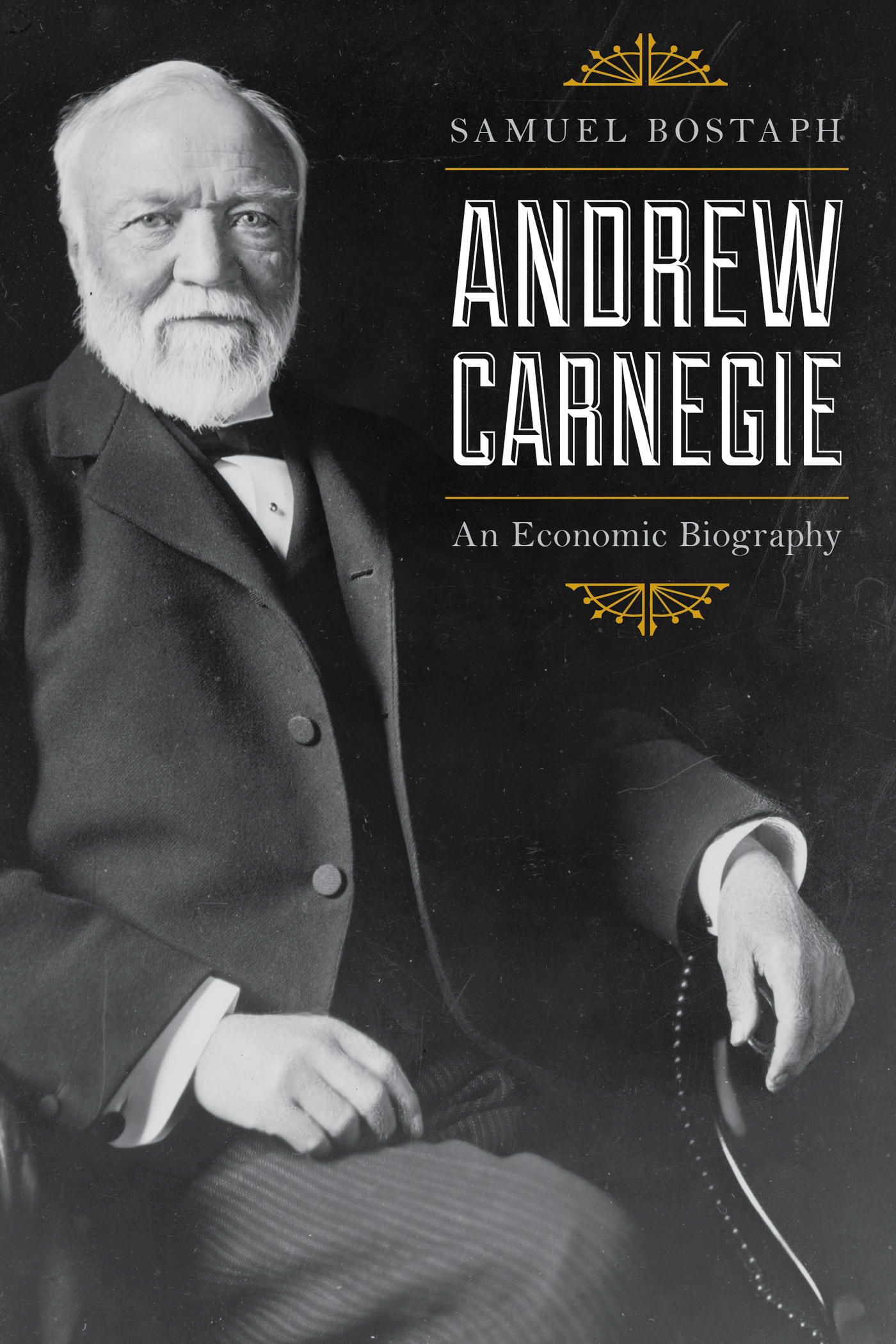Andrew Carnegie
Andrew Carnegie
An Economic Biography
Updated Edition
Samuel Bostaph
ROWMAN & LITTLEFIELD
Lanham Boulder New York London
Published by Rowman & Littlefield
A wholly owned subsidiary of The Rowman & Littlefield Publishing Group, Inc.
4501 Forbes Boulevard, Suite 200, Lanham, Maryland 20706
www.rowman.com
Unit A, Whitacre Mews, 26-34 Stannary Street, London SE11 4AB
Distributed by NATIONAL BOOK NETWORK
Copyright 2017 by Rowman & Littlefield
All rights reserved. No part of this book may be reproduced in any form or by any electronic or mechanical means, including information storage and retrieval systems, without written permission from the publisher, except by a reviewer who may quote passages in a review.
British Library Cataloguing in Publication Information Available
Library of Congress Cataloging-in-Publication Data
Names: Bostaph, Samuel, author.
Title: Andrew Carnegie : an economic biography / Samuel Bostaph.
Description: Updated edition. | Lanham : Rowman & Littlefield, 2017. | Includes bibliographical references and index.
Identifiers: LCCN 2017020270 (print) | LCCN 2017029689 (ebook) | ISBN 9781538106006 (electronic) | ISBN 9781538100400 (pbk. : alk. paper)
Subjects: LCSH: Carnegie, Andrew, 18351919. | IndustrialistsUnited StatesBiography. | PhilanthropistsUnited StatesBiography. | Steel industry and tradeUnited StatesHistory.
Classification: LCC CT275.C3 (ebook) | LCC CT275.C3 B67 2017 (print) | DDC 338.7672092 [B]dc23
LC record available at https://lccn.loc.gov/2017020270
 TM The paper used in this publication meets the minimum requirements of American National Standard for Information Sciences Permanence of Paper for Printed Library Materials, ANSI/NISO Z39.48-1992.
TM The paper used in this publication meets the minimum requirements of American National Standard for Information Sciences Permanence of Paper for Printed Library Materials, ANSI/NISO Z39.48-1992.
Printed in the United States of America
To my daughters, Katie and Megan, and to Maureen Tweedy
Preface
This biography of Andrew Carnegie is an economic biography in the same sense that Jonathan R. T. Hughess fine study The Vital Few: The Entrepreneur & American Economic Progress (1965) can be described as a collection of economic biographies. Hughes presented the saga of ten entrepreneurial pioneers, including Carnegie, who were key figures in building the foundations of the American economy from the late seventeenth through the mid-twentieth centuries. His approach was to place each representative figure in his or her respective context and then relate how each contributed to the economic progress of that age. My ambition is both more modest and more specific. I restrict my story to that of one man and to the economic history of his rise from a poverty-stricken Scottish childhood to prominence as an international industrial leader, philanthropist, and peace advocate. I also treat him as an economic actor, whose alertness to profit opportunities and success in dealing with uncertainty in his profit-seeking efforts had both positive and negative effects for economic coordination in the U.S. and world market economies.
Like Hughes, I do not present Carnegie in all his detailed and multifaceted life, instead concentrating on his entrepreneurial role during the period when the United States was transformed from an agricultural and raw materials supplier into a manufacturing and industrial center. The three major historical biographies of Carnegie by Burton Hendrick (1932), Joseph Frazier Wall (1970), and David Nasaw (2006) are foundational to understanding Carnegie the man. Each in its own way is an excellent source of biographical detail. What this current book provides is an understanding of Carnegie as a dynamic entrepreneurial actor. It is that aspect of his existence in the burgeoning market economy of nineteenth-century America that has not previously received the emphasis it deserves.
Despite his many character flaws, Andrew Carnegie was arguably the most important entrepreneurial figure in the late nineteenth-century industrialization of the United States. In the following pages, I focus on his role as a driving force in the ascent of the United States to the position of premier manufacturing center of the world. It is also shown that he and his associates were sometimes agents of tremendous malinvestments, or even outright wastes of resources (which would have found other, more efficient channels of production for their usage than those to which they were actually put).
The world we inhabit is ruled by the physical laws given to us by nature, but it is also ruled by social laws that provide the context within which man employs nature to assist him in his purposeful actions. Physical laws are exact and constant in their causal implications, and mans physical being, as a part of nature, is governed by those laws. In addition, purposeful human actions reveal laws of rational choice, one category of which we term economic laws. Unlike physical laws, economic laws can be disregarded by acting man in choosing his ends and directing his actions; however, all actions have consequences, not all of which advance the ends chosen. It is no more possible to make a profit by selling a product at less than its resource opportunity cost than it is to sustain life while breathing in a vacuum. In addition, the political and cultural laws of societythe adopted rules that govern human interaction and create social institutionsare human constructs that may either aid or impede human flourishing, depending on their wisdom. Driven by his ambition, and acting within the political rules and the social institutions of his day, Andrew Carnegie pursued his own concepts of what was required for human flourishing as well as his own.
My thanks to Edward Younkins for suggesting that I send the original book proposal to Lexington Books; to Joseph C. Parry, Emily Roderick, and Sarah Craig for encouragement, support, and seeing the book through to press; to Jed Lyons for encouraging me to add new material to the original manuscript for an updated Rowman & Littlefield edition; and to Jonathan Sisk, Katelyn Powers, and Patricia Stevenson for reading, editing, and correcting the resulting trade paperback edition. From their efforts, it is much improved. I remain responsible for any remaining errors or omissions.
Introduction
In 1848, Andrew Carnegie was an impoverished and barely educated thirteen-year-old Scottish immigrant, whose first American job was bobbin boy in the Anchor Cotton Mill in Allegheny City, Pennsylvania. Although that city and Pittsburgh were separated by the Allegheny River, both were equally soot-drenched, thriving manufacturing and transportation centers. That thirteen-year-old boy worked twelve-hour days, six days a week, for which he was initially paid $1.20. Energetic, highly intelligent, and fueled by ambition, he went from bobbin boy to steam engine tender to accounts clerk to telegraph messenger boy within one year, his working conditions improving and his pay more than doubling as he rose. Assessing that period in his autobiography, Carnegie remarked, There was scarcely a minute in which I could not learn something or find out how much there was to learn and how little I knew (Carnegie, 1920, p. 39). As a result of this thirst for learning and his skillful use of it, in less than five years he had become the personal clerk and telegraph operator for Thomas A. Scott, the superintendent of the western Pennsylvania division of the Pennsylvania Railroad. By age seventeen, Andy Carnegie had his feet set firmly on the road to enormous wealth and legendary success in both business and philanthropy.
Next page
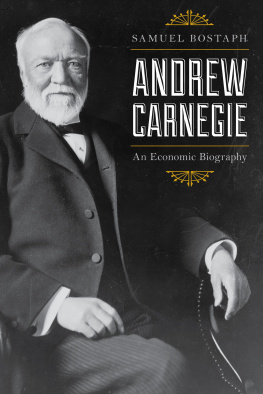
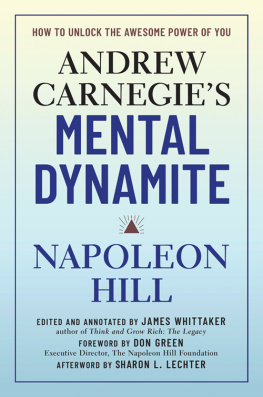

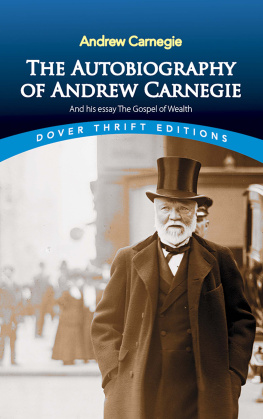
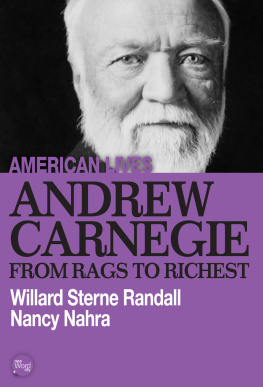
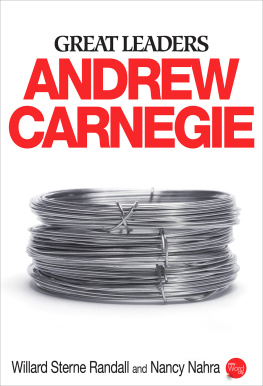

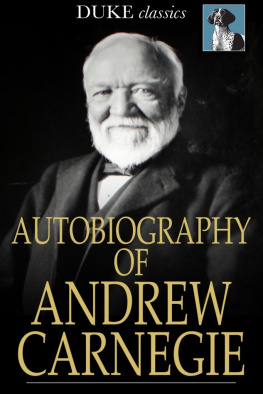

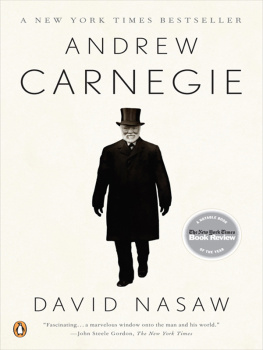
 TM The paper used in this publication meets the minimum requirements of American National Standard for Information Sciences Permanence of Paper for Printed Library Materials, ANSI/NISO Z39.48-1992.
TM The paper used in this publication meets the minimum requirements of American National Standard for Information Sciences Permanence of Paper for Printed Library Materials, ANSI/NISO Z39.48-1992.